Australia to recognise Palestinian state at United Nations in September
Ukraine peace summit: Why some countries refused to sign the plan
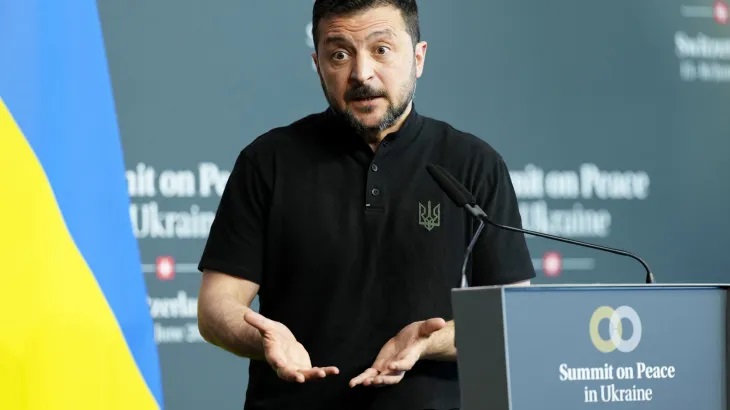
Ukraine's President Volodymyr Zelensky addresses Ukraine's closing press conference of the Summit on peace in Ukraine, at the luxury Burgenstock resort
- Major Global South nations cited Russia’s absence or Israel’s presence as reasons for not accepting the communique.
About 100 delegations from countries and international organisations attended the Switzerland-hosted Summit on Peace in Ukraine last weekend, aimed at crafting a path that many participants said could pave the way to ending Russia’s war on its smaller neighbour.
But while a vast majority of participants signed on to the short communique issued at the end of the summit, several key nations did not. The two-day diplomatic summit took place in the Burgenstock resort in Stansstad, Switzerland, and was attended by United States Vice President Kamala Harris alongside leaders from the United Kingdom, Canada, France, Germany, Italy and Japan, and diplomats from many other nations.
What did the Ukraine peace communique say?
The communique laid out what it said was a “common vision” on “crucial aspects”, including that:
- All nuclear installations, including the Zaporizhzhia Nuclear Power Plant, should be safe according to International Atomic Energy Agency (IAEA) principles and under IAEA supervision. The power plant, Europe’s largest, has been at the centre of Russia-Ukraine battles since the early days of the war, sparking concerns about the potential for a nuclear accident.
- The free flow of Ukrainian agricultural products should be allowed to interested third countries. “Global food security depends on uninterrupted manufacturing and supply of food products,” the communique said. The document described attacks on merchant ships and civilian port infrastructure in the Black Sea and Azov Sea as “unacceptable”.
- All prisoners must be exchanged and all Ukrainian civilians who have been unlawfully displaced should be returned to Ukraine. In particular, the communique said, “all deported and unlawfully displaced Ukrainian children, and all other Ukrainian civilians who were unlawfully detained, must be returned to Ukraine”. According to Ukraine, 20,000 children have been taken by Russian authorities during the war.
Who signed the joint communique on Ukraine?
In all, 82 delegations signed on to support the communique. Swiss President Viola Amherd told a news conference the “great majority” of participants agreed to the document.
Some of these include: Australia, Austria, Canada, Chile, Costa Rica, Cote d’Ivoire, the European Commission, the European Council, the European Parliament, France, Georgia, Germany, Ghana, Greece, Ireland, Israel, Italy, Japan, Kenya, Kosovo, Latvia, Norway, Palau, Qatar, Serbia, Turkey, Ukraine, the UK and the US.
Which countries did not sign on?
India, Mexico, Saudi Arabia, South Africa, Thailand, Indonesia and the United Arab Emirates attended the summit, represented by foreign ministers and envoys, but were among those who did not sign the joint communique.
Brazil attended the Ukraine summit as an observer, but did not back the communique.
Russia was not invited to the summit, which Moscow dismissed as “futile”. China also did not attend the two-day event. Pakistan, which counts China as its closest ally, was invited but chose not to attend.
Why did they not sign on?
India: In a statement, Secretary (West) of India’s Ministry of External Affairs Pavan Kapoor said that New Delhi decided to avoid association with the joint communique because of Russia’s absence from the summit. He said India believes that peace in Ukraine requires bringing together “all stakeholders and a sincere and practical engagement between the two parties to the conflict”.
Saudi Arabia: Prince Faisal bin Farhan al Saud, the foreign minister of Saudi Arabia, shared similar concerns while delivering his statement at the summit. “We believe it is important that the international community encourage any step towards serious negotiations, which will require difficult compromises as part of a roadmap that leads to peace,” he said. “And here, it is essential to emphasise that any credible process will need Russia’s participation.”
South Africa: South Africa’s reasons for not backing the communique were different. The country’s National Security Advisor Sydney Mufamadi wrote in a statement that “it was surprising that at this conference, Israel is present and participating”, five days after a United Nations-backed commission accused Israel of committing war crimes against Palestinians. Mufamadi questioned the legitimacy of a communique that its sponsors argued was driven by “respect for international law” when Israel has been accused by many UN officials of violating international law. South Africa has accused Israel of genocide in Gaza in a case at the International Court of Justice.


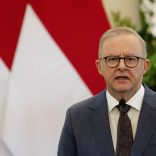
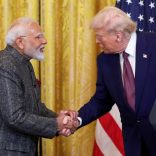
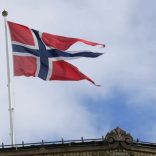
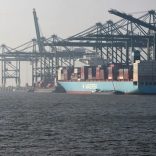






Leave a Reply
Be the First to Comment!
You must be logged in to post a comment.
You must be logged in to post a comment.